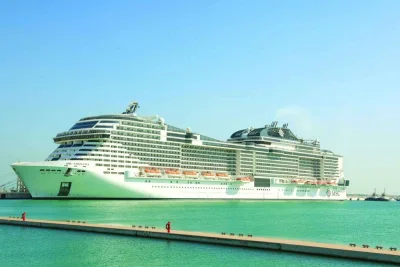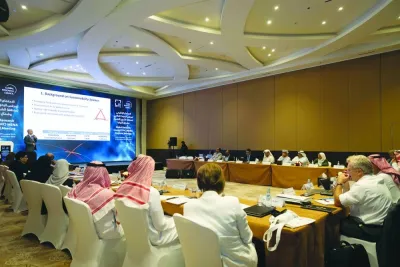Nearly 200 nations agreed on Thursday to launch a fund to support countries hit by global warming, in a “historic” moment at the start of UN climate talks in the UAE.
The landmark announcement came as the Emirati host of the COP28 talks declared that fossil fuels must be part of any final climate deal negotiated over the next two weeks.
The talks in Dubai come at a pivotal moment for the planet, with emissions still rising and the UN declaring 2023 on track to become the hottest year in human history.
The formal establishment of the “loss and damage” fund long sought by climate-vulnerable nations provided an early win at COP28, where sharp divisions over the phasing out of fossil fuels were immediately apparent.
“We have delivered history today,” said COP28 president Sultan al-Jaber as delegates embraced, cheered and gave a standing ovation.
Al-Jaber said it was “the first time a decision has been adopted on day one of any COP and the speed in which we have done so is also unique, phenomenal and historic.
“This is evidence that we can deliver. COP28 can and will deliver,” he said.
Leaders have been urged to move more quickly to a clean energy future and make deeper cuts to emissions, with the world off-track to keep global temperature rises below agreed levels.
A central focus of COP28 will be a stocktake of the world’s limited progress on curbing global warming, which requires an official response at these talks.
Double the size of last year’s COP27, the conference is billed as the largest ever.
More than 140 heads of state and government will deliver speeches over today and tomorrow, starting with Britain’s King Charles III who will ceremonially kick things off.
Climate finance has been a key sticking point at COP, with wealthy nations most responsible for emissions not delivering on promises to support the vulnerable states who are worst affected but least responsible for global warming.
The UAE announced $100mn toward the loss and damage fund with the European Union following with $246mn.
More pledges are expected in coming days, but the amounts so far fall well short of the $100bn developing nations say are needed.
“The progress we’ve made in establishing a loss and damage fund is hugely significant for climate justice, but an empty fund can’t help our people,” warned Madeleine Diouf Sarr, chair of the Group of the 46 Least Developed Countries.
In his opening address, al-Jaber told delegates they must “ensure the inclusion of the role of fossil fuels” in any final climate agreement, and praised oil companies for coming to the table.
“They can lead the way. And then leading the way will ensure that others follow and catch up,” he said.
The UAE hopes to marshal an agreement on the tripling of renewable energy and doubling the annual rate of energy efficiency improvements by 2030.
Nations will navigate a range of thorny issues between November 30 and December 12, and experts say building trust could be a huge challenge.
At the opening of the conference, delegates paused for a minute’s silence for civilians killed in the Gaza conflict.
On the sidelines, Israeli President Isaac Herzog will hold talks with diplomats on the release of hostages held by Hamas, his office said.
Neither of the leaders of the world’s two biggest polluters — the US and China — are attending, though Beijing and Washington did make a rare joint climate announcement ahead of COP.
Finding common ground can be difficult at COP where all nations — whether dependent on oil, sinking beneath rising seas or locked in geopolitical rivalry — must take decisions unanimously.
UN climate chief Simon Stiell said the agreement on loss and damage gave COP “a running start” and urged nations to carry this momentum into the gruelling days of back and forth ahead.
“We must keep our eyes on the prize, and every minute counts,” he said.
The landmark announcement came as the Emirati host of the COP28 talks declared that fossil fuels must be part of any final climate deal negotiated over the next two weeks.
The talks in Dubai come at a pivotal moment for the planet, with emissions still rising and the UN declaring 2023 on track to become the hottest year in human history.
The formal establishment of the “loss and damage” fund long sought by climate-vulnerable nations provided an early win at COP28, where sharp divisions over the phasing out of fossil fuels were immediately apparent.
“We have delivered history today,” said COP28 president Sultan al-Jaber as delegates embraced, cheered and gave a standing ovation.
Al-Jaber said it was “the first time a decision has been adopted on day one of any COP and the speed in which we have done so is also unique, phenomenal and historic.
“This is evidence that we can deliver. COP28 can and will deliver,” he said.
Leaders have been urged to move more quickly to a clean energy future and make deeper cuts to emissions, with the world off-track to keep global temperature rises below agreed levels.
A central focus of COP28 will be a stocktake of the world’s limited progress on curbing global warming, which requires an official response at these talks.
Double the size of last year’s COP27, the conference is billed as the largest ever.
More than 140 heads of state and government will deliver speeches over today and tomorrow, starting with Britain’s King Charles III who will ceremonially kick things off.
Climate finance has been a key sticking point at COP, with wealthy nations most responsible for emissions not delivering on promises to support the vulnerable states who are worst affected but least responsible for global warming.
The UAE announced $100mn toward the loss and damage fund with the European Union following with $246mn.
More pledges are expected in coming days, but the amounts so far fall well short of the $100bn developing nations say are needed.
“The progress we’ve made in establishing a loss and damage fund is hugely significant for climate justice, but an empty fund can’t help our people,” warned Madeleine Diouf Sarr, chair of the Group of the 46 Least Developed Countries.
In his opening address, al-Jaber told delegates they must “ensure the inclusion of the role of fossil fuels” in any final climate agreement, and praised oil companies for coming to the table.
“They can lead the way. And then leading the way will ensure that others follow and catch up,” he said.
The UAE hopes to marshal an agreement on the tripling of renewable energy and doubling the annual rate of energy efficiency improvements by 2030.
Nations will navigate a range of thorny issues between November 30 and December 12, and experts say building trust could be a huge challenge.
At the opening of the conference, delegates paused for a minute’s silence for civilians killed in the Gaza conflict.
On the sidelines, Israeli President Isaac Herzog will hold talks with diplomats on the release of hostages held by Hamas, his office said.
Neither of the leaders of the world’s two biggest polluters — the US and China — are attending, though Beijing and Washington did make a rare joint climate announcement ahead of COP.
Finding common ground can be difficult at COP where all nations — whether dependent on oil, sinking beneath rising seas or locked in geopolitical rivalry — must take decisions unanimously.
UN climate chief Simon Stiell said the agreement on loss and damage gave COP “a running start” and urged nations to carry this momentum into the gruelling days of back and forth ahead.
“We must keep our eyes on the prize, and every minute counts,” he said.
 Kokani.me Kokani.me
Kokani.me Kokani.me



